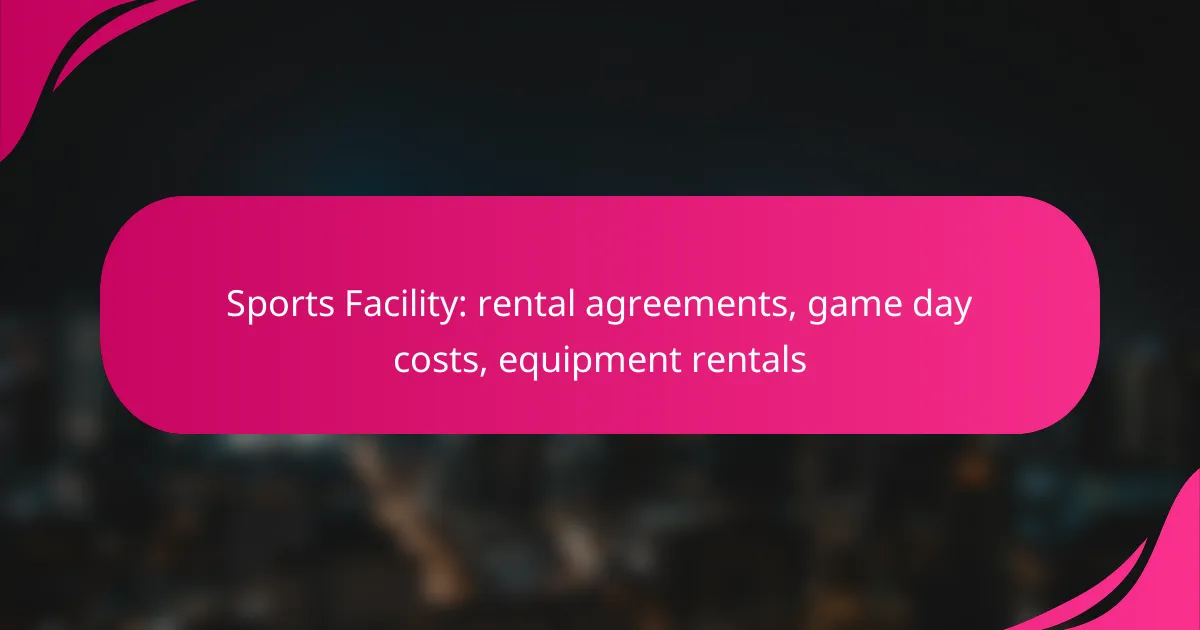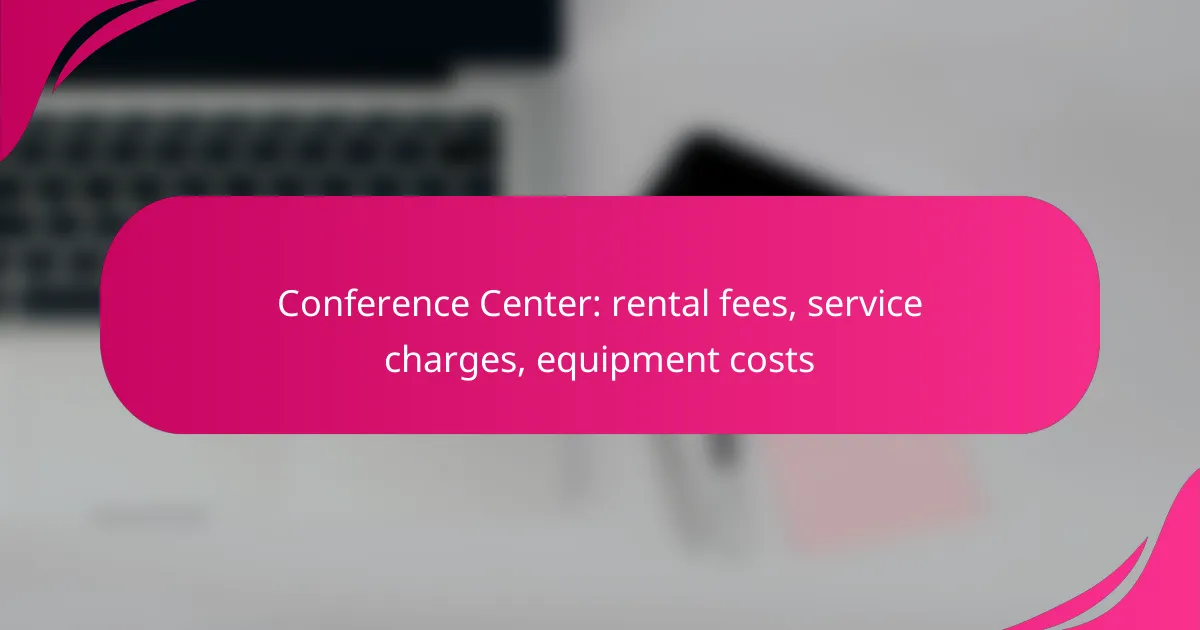When planning an event at a sports facility, understanding rental agreements is crucial for securing favorable terms. Game day costs can vary widely, encompassing venue fees, staffing, and insurance, which can add up quickly. Additionally, selecting the right equipment rentals tailored to your event’s needs is essential for ensuring a successful experience.

How to negotiate sports facility rental agreements in London?
Negotiating sports facility rental agreements in London involves understanding the terms and being prepared to discuss key points. Effective negotiation can lead to better rates and conditions that suit your needs.
Understand standard terms
Familiarize yourself with common rental terms such as duration, payment schedules, and cancellation policies. Most agreements will outline the responsibilities of both parties, including maintenance and liability clauses.
Typical rental rates for sports facilities in London can vary widely, often ranging from £50 to £200 per hour depending on the location and amenities. Knowing these standards helps in assessing fair pricing.
Identify key negotiation points
Focus on aspects that can significantly impact your budget, such as the rental fee, deposit requirements, and additional costs for equipment or staffing. Consider negotiating for discounts on longer bookings or off-peak times.
Be prepared to discuss flexibility in terms of usage hours and the possibility of including equipment rentals in the agreement. This can streamline costs and simplify logistics.
Consult with legal experts
Engaging a legal expert can provide clarity on complex terms and protect your interests. They can help identify any hidden clauses that may affect your rights or financial obligations.
Legal professionals familiar with sports facility agreements can also assist in drafting or reviewing contracts to ensure compliance with local regulations and standards, minimizing future disputes.

What are the typical game day costs for sports facilities in the UK?
Typical game day costs for sports facilities in the UK can vary significantly based on location, facility type, and event size. Key expenses include venue rental fees, staffing, security, and insurance, which together can amount to a substantial sum for organizers.
Venue rental fees
Venue rental fees are one of the largest expenses for hosting a game day. In the UK, these fees can range from a few hundred to several thousand pounds, depending on the facility’s size and location. For instance, a small community sports hall may charge around £200-£500, while a larger stadium could demand £2,000 or more.
When budgeting for venue rental, consider additional costs such as utilities, cleaning fees, and any required deposits. It’s advisable to book well in advance to secure better rates and availability, especially for popular venues.
Staffing and security expenses
Staffing and security expenses are crucial for ensuring a safe and well-managed event. This can include hiring referees, event staff, and security personnel. Depending on the size of the event, these costs can range from £100 for a small gathering to over £1,000 for larger events requiring extensive security measures.
Always check local regulations regarding security requirements, as some venues may mandate a certain number of security personnel based on expected attendance. Planning ahead can help avoid last-minute staffing shortages and associated costs.
Insurance requirements
Insurance is essential for protecting against liabilities during game day events. Most facilities will require proof of public liability insurance, which typically covers injuries to participants and spectators. Costs for this insurance can vary, but organizers should budget around £100-£500 depending on the event’s scale and risk factors.
It’s important to review the specific insurance requirements of the venue and ensure compliance well ahead of the event. Failure to provide adequate insurance can lead to cancellation or additional fees, so thorough preparation is key.

How to choose the right equipment rentals for your event?
Selecting the right equipment rentals for your event involves understanding your specific needs, comparing rental providers, and ensuring the quality and availability of the equipment. This process can significantly impact the success of your event, so careful consideration is essential.
Assess event requirements
Begin by identifying the specific requirements of your event, including the type of activities planned and the number of participants. Consider factors such as the venue size, the duration of the event, and any special needs that may arise.
For example, if you are hosting a sports tournament, you may need a variety of equipment such as goals, nets, and seating for spectators. Make a checklist of all necessary items to ensure nothing is overlooked.
Compare rental providers
Research multiple rental providers to compare their offerings, pricing, and terms. Look for companies that specialize in the type of equipment you need and have a good reputation in your area.
Request quotes from at least three providers to gauge average costs. Be sure to ask about delivery fees, setup costs, and any additional charges that may apply. This will help you find the best deal while ensuring you receive quality service.
Check equipment quality and availability
Before finalizing your rental, verify the quality and condition of the equipment. Ask for recent maintenance records or inspect the items in person if possible. High-quality equipment can enhance the experience for participants and spectators alike.
Additionally, confirm the availability of the equipment for your event date. Popular items may be booked well in advance, so it’s wise to secure your rentals as early as possible to avoid last-minute issues.

What are the common terms in sports facility rental agreements?
Sports facility rental agreements typically include key terms that outline the responsibilities and expectations of both the facility owner and the renter. Understanding these terms can help avoid misunderstandings and ensure a smooth rental experience.
Duration of rental
The duration of rental specifies the time period for which the facility is reserved. This can range from a few hours for a single event to several days for tournaments or extended use. It’s essential to clarify the start and end times, including setup and teardown periods.
Some facilities may offer discounts for longer rental periods, so consider negotiating terms if you plan to rent for multiple days or recurring events.
Payment schedules
Payment schedules outline when payments are due and the accepted methods of payment. Typically, a deposit is required to secure the reservation, with the balance due before the rental date. Common practices include full payment upfront or installment plans for larger rentals.
Be aware of any additional fees that may apply, such as cleaning or equipment rental costs, and ensure these are clearly stated in the agreement.
Cancellation policies
Cancellation policies detail the terms under which a renter can cancel their reservation and any associated penalties. Many facilities have a tiered cancellation policy, where the closer the cancellation is to the rental date, the higher the fee.
It’s advisable to review these policies carefully and consider purchasing cancellation insurance if available, especially for large events or tournaments that may be affected by unforeseen circumstances.

What factors influence game day costs at sports facilities?
Game day costs at sports facilities are influenced by various factors, including the location and type of facility, the size and duration of the event, and any additional services required. Understanding these elements can help in budgeting effectively for a successful event.
Location and facility type
The location of a sports facility significantly impacts costs, as urban venues typically charge higher rates than those in rural areas. Additionally, specialized facilities, such as stadiums or arenas, may have different pricing structures compared to multipurpose gyms or community centers.
For example, renting a high-capacity stadium in a major city could range from several thousand to tens of thousands of dollars, while a local gym might charge a few hundred to a couple of thousand. Always consider the facility’s reputation and amenities, as these can also affect pricing.
Event size and duration
The size of the event, including the number of participants and spectators, plays a crucial role in determining costs. Larger events may require more resources, leading to higher fees for space and services. Additionally, the duration of the event can influence rental rates, with longer events often incurring higher costs.
For instance, a half-day rental for a small tournament might cost less than a full-day rental for a large championship. It’s advisable to clarify the facility’s pricing structure for different time slots and group sizes to avoid unexpected expenses.
Additional services required
Many sports facilities offer additional services that can enhance the event experience but also add to the overall cost. These services may include equipment rentals, catering, security, and technical support. Depending on the facility, these services can be bundled or charged separately.
For example, renting equipment like goals or nets may cost extra, while catering services could significantly increase the total bill. When planning, assess which services are essential and seek quotes from multiple providers to ensure competitive pricing.

How to find affordable sports equipment rentals in London?
Finding affordable sports equipment rentals in London involves researching local rental shops, comparing prices, and considering online platforms. Many businesses offer competitive rates, especially during off-peak seasons or for longer rental durations.
Research local rental shops
Start by identifying sports equipment rental shops in your area. Look for businesses that specialize in the type of equipment you need, whether it’s for team sports, individual activities, or outdoor adventures. Check their websites or call them to inquire about pricing and availability.
Local shops often have promotions or discounts for first-time customers or bulk rentals. Visiting in person can also help you assess the condition of the equipment before renting.
Compare online platforms
Online rental platforms can provide a wider selection and competitive pricing. Websites like Fat Llama or RentMyItems allow users to rent equipment directly from individuals or businesses. This can often lead to lower costs compared to traditional rental shops.
When using online platforms, read reviews and check the rental terms carefully. Look for hidden fees or deposit requirements that could affect the overall cost.
Consider off-peak rentals
Renting equipment during off-peak times can lead to significant savings. Many rental shops offer lower rates during weekdays or outside of peak sports seasons. If your schedule allows, consider planning your activities during these times.
Additionally, some shops may offer discounts for longer rental periods, so if you need equipment for multiple days, inquire about package deals.



